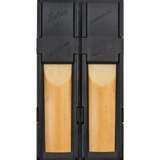Hi, I'm a new (older) clarinet player and this is my first post. I've been practicing for about a ear now and I'm wondering if anyone can suggest a sorting / marking system for reeds. Every time I buy a new box of reeds I try and play through them and pick out the best. But some seem more squeaky than other, some seem harder than others, some seem thin in sound, and some have other personalities and are hard to describe. I haven't run into a marking system yet but it might be easier to adopt a system used by an experienced player rather than reinventing it.
Also, I have a piece of fine 600 grit sand paper glued on a flat piece of glass that I use for the squeaky reeds in hopes that its just a simple flatness problem. Any suggestions of other treatments for these would also be greatly appreciated. I do have a teacher who has pointed out that embrouchure has much to do with reeds squeaking and I try and address this aspect but some reeds just don't squeak as much and some do.
Thanks in advance for any advice,
David R.
Oakland, CA
Also, I have a piece of fine 600 grit sand paper glued on a flat piece of glass that I use for the squeaky reeds in hopes that its just a simple flatness problem. Any suggestions of other treatments for these would also be greatly appreciated. I do have a teacher who has pointed out that embrouchure has much to do with reeds squeaking and I try and address this aspect but some reeds just don't squeak as much and some do.
Thanks in advance for any advice,
David R.
Oakland, CA


